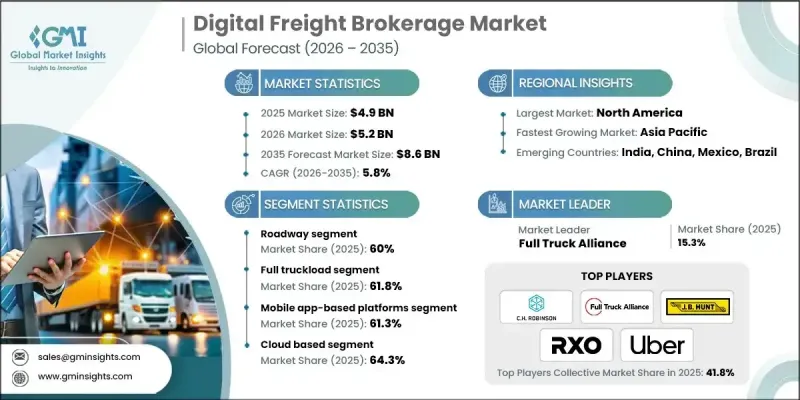
|
市場調査レポート
商品コード
1892882
デジタル貨物仲介市場の機会、成長要因、業界動向分析、および2026年から2035年までの予測Digital Freight Brokerage Market Opportunity, Growth Drivers, Industry Trend Analysis, and Forecast 2026 - 2035 |
||||||
カスタマイズ可能
|
|||||||
| デジタル貨物仲介市場の機会、成長要因、業界動向分析、および2026年から2035年までの予測 |
|
出版日: 2025年12月09日
発行: Global Market Insights Inc.
ページ情報: 英文 225 Pages
納期: 2~3営業日
|
概要
世界のデジタル貨物仲介市場は、2025年に49億米ドルと評価され、2035年までにCAGR5.8%で成長し、86億米ドルに達すると予測されています。

荷主が自動化された貨物マッチングシステムや運送業者の空き容量をリアルタイムで確認できるデジタルツールへの依存度を高めるにつれ、市場成長は加速しています。コスト効率は依然として主要な動機であり、荷主は業務の効率化、手作業プロセスの最小化、輸送費の削減を目的としてオンラインプラットフォームを活用しています。デジタル仲介プラットフォームは積荷割当てを最適化することで空走行距離を削減し、資産利用率の向上、運送業者の収益増加、サービス全体の信頼性向上に貢献します。デジタル処理される国際貨物の増加とコンプライアンス監視強化の推進も、自動割り当て技術の採用を後押ししています。同時に業界は、価格設定の精度と路線レベルのパフォーマンス可視性を向上させるAI駆動型予測モデルへ急速に移行中です。こうした予測機能はコスト安定化とサービス効率強化に寄与し、あらゆる貨物カテゴリーにおけるデジタル仲介ツールの需要をさらに押し上げています。
| 市場範囲 | |
|---|---|
| 開始年 | 2025年 |
| 予測年度 | 2026-2035 |
| 開始時価値 | 49億米ドル |
| 予測金額 | 86億米ドル |
| CAGR | 5.8% |
クラウドベースのカテゴリーは、クラウド対応貨物システムへの急速な移行により強化され、2025年には64.3%のシェアを占めました。現在、新規貨物管理プラットフォームの大部分はクラウドアーキテクチャに依存しており、物流業務の近代化を加速させる世界のクラウド投資によって支えられています。
モバイルアプリベースのプラットフォームセグメントは、2025年に61.3%のシェアを占めました。スマートフォンの普及とドライバー向けエンゲージメントツールが利用を促進し続け、積荷情報への即時アクセス、書類管理、位置情報に基づくマッチング機能を実現しています。
米国デジタル貨物仲介市場は2025年に86.2%のシェアを占め、17億6,000万米ドルの規模に達しました。強力なデジタルネットワーク、高い道路貨物輸送量、拡大するラストマイル需要が、地域全体でのプラットフォーム導入を支えています。個人事業主のトラック運転手や小規模な運送会社は、安定した輸送能力を確保するため、モバイル対応の積荷通知やテレマティクス接続をますます活用しています。
よくあるご質問
目次
第1章 調査手法
- 市場範囲と定義
- 調査設計
- 調査アプローチ
- データ収集方法
- データマイニングソース
- 世界
- 地域別/国別
- 基本推定値と計算
- 基準年計算
- 市場推定における主要な動向
- 1次調査と検証
- 一次情報
- 予測モデル
- 調査前提条件と制限事項
第2章 エグゼクティブサマリー
第3章 業界考察
- エコシステム分析
- サプライヤーの情勢
- 利益率分析
- コスト構造
- 各段階における付加価値
- バリューチェーンに影響を与える要因
- ディスラプション
- 業界への影響要因
- 促進要因
- 電子商取引貨物量の成長
- 自動化された仲介業務フローへの移行
- 可視化および追跡ツールの拡充
- テレマティクスとフリートデータの統合
- 業界の潜在的リスク&課題
- 分断されたキャリアエコシステム
- データプライバシーとプラットフォーム依存性に関する懸念
- 市場機会
- 統合型マルチモーダルプラットフォームの拡張
- AIベースの価格設定とマッチングの採用
- 国境を越えたデジタル回廊の成長
- 成長可能性分析
- 規制情勢
- 北米
- FMCSA規制
- カナダ運輸庁(CTA)ガイドライン
- 欧州
- EU輸送規制
- 電子貨物指令
- 一般データ保護規則(GDPR)
- 英国一般データ保護規則(UK GDPR)
- デジタルタコグラフ規則
- アジア太平洋地域
- 道路貨物輸送に関する行政措置
- サイバーセキュリティ法
- 物流効率化に関する施策の実施
- 自動車法2019
- 運輸事業法
- スマートロジスティクス構想
- ラテンアメリカ
- 国家陸上運輸庁(ANTT)の規制
- 連邦道路運送法
- USMCA規制
- 中東・アフリカ
- アラブ首長国連邦連邦運輸法
- サウジアラビアの輸送・物流規制
- 道路交通法
- 北米
- ポーター分析
- PESTEL分析
- 技術とイノベーションの動向
- 現在の技術動向
- 新興技術
- コスト内訳分析
- 輸送コスト
- 技術・プラットフォームコスト
- 運営コスト
- 規制・コンプライアンス関連費用
- 燃料・エネルギーコスト
- 特許分析
- 持続可能性と環境面
- 持続可能な実践
- 廃棄物削減戦略
- 生産におけるエネルギー効率
- 環境に配慮した取り組み
- カーボンフットプリントに関する考慮事項
- 価格分析
- 地域別
- サービス別
- ユースケース
- ベストケースシナリオ
- 市場参入戦略
- 地域別市場浸透戦略
- 新規参入企業における主要な規制上の考慮事項
- 価格設定、サービス、差別化戦略
第4章 競合情勢
- イントロダクション
- 企業の市場シェア分析
- 北米
- 欧州
- アジア太平洋地域
- ラテンアメリカ
- 中東・アフリカ地域
- 主要市場企業の競合分析
- 競合ポジショニングマトリックス
- 戦略的展望マトリックス
- 主な発展
- 合併・買収
- 提携・協業
- 新製品の発売
- 事業拡大計画と資金調達
第5章 市場推計・予測:輸送手段別、2022-2035
- 主要動向
- 道路輸送
- 海上輸送
- 航空輸送
- 鉄道
第6章 市場推計・予測:サービス別、2022-2035
- 主要動向
- フルトラックロード(FTL)
- 小口貨物輸送(LTL)
- インターモーダル輸送
第7章 市場推計・予測:プラットフォーム別、2022-2035
- 主要動向
- モバイルアプリベースのプラットフォーム
- ウェブベースのプラットフォーム
第8章 市場推計・予測:導入モデル別、2022-2035
- 主要動向
- クラウドベース
- オンプレミス
- ハイブリッド
第9章 市場推計・予測:企業規模別、2022-2035
- 主要動向
- 中小企業(SMEs)
- 大企業
第10章 市場推計・予測:用途別、2022-2035
- 主要動向
- 貨物管理
- 運送会社と荷主のマッチング
- 価格入札・オークション
- リアルタイム追跡と分析
- 自動化された文書化
- その他
第11章 市場推計・予測:最終用途別、2022-2035
- 主要動向
- 小売業および電子商取引
- 自動車
- 製造業
- 消費財
- ヘルスケア
- 食品・飲料
- その他
第12章 市場推計・予測:地域別、2022-2035
- 主要動向
- 北米
- 米国
- カナダ
- 欧州
- ドイツ
- 英国
- フランス
- イタリア
- スペイン
- ロシア
- 北欧諸国
- オランダ
- スウェーデン
- アジア太平洋地域
- 中国
- インド
- 日本
- オーストラリア
- 韓国
- シンガポール
- タイ
- インドネシア
- ベトナム
- ラテンアメリカ
- ブラジル
- メキシコ
- アルゼンチン
- 中東・アフリカ地域
- 南アフリカ
- サウジアラビア
- アラブ首長国連邦
- トルコ
第13章 企業プロファイル
- 世界プレイヤー
- C.H. Robinson
- Coyote Logistics
- Echo Global Logistics
- Hub Group
- J.B. Hunt
- Landstar System
- Total Quality Logistics
- Uber
- Worldwide Express
- XPO
- 地域プレーヤー
- Allen Lund
- ArcBest
- BNSF Logistics
- England Logistics
- GlobalTranz Enterprises
- MATSON Logistics
- Schneider
- Transplace
- Werner Enterprises
- 新興企業/ディスラプター
- Armstrong Transport Group
- Ascent Global Logistics
- Expeditors International
- NTG Freight
- Trinity Logistics


